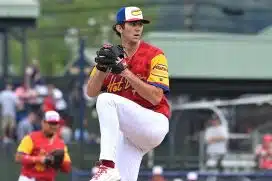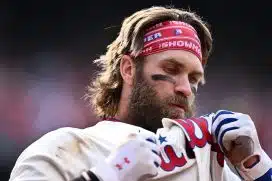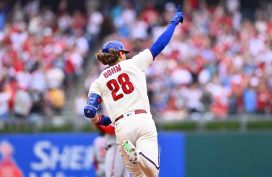By Tim Kelly, Sports Talk Philly editor
While former Philadelphia Phillies ace Curt Schilling has previously suggested that his political views may have cost him some Hall of Fame votes, the 50-year-old made a surprising declaration about his candidacy for the Hall of Fame in a recent interview.
The 2013 Phillies Wall of Fame inductee appeared on Pardon My Take, and said that if he was a voter for the Hall of Fame, he wouldn't vote for himself:
Big Cat (host): Do you think that you have the numbers to be in the Hall of Fame?
Curt Schilling: In my Hall of Fame? No.
—-
Curt Schilling (to Big Cat and other host PFT Commenter): Want me to give you the litmus test?
Big Cat: Yeah.
Curt Schilling: So I'm going to name names, you say yes or no to Hall of Fame, OK?
Big Cat: OK.
Curt Schilling: Nolan Ryan?
Big Cat and PFT Commenter: Yes
Curt Schilling: Rickey Henderson?
Big Cat and PFT Commenter: Yes
Curt Schilling: Randy Johnson?
Big Cat and PFT Commenter: Yes
Curt Schilling: Mike Mussina
Big Cat: Ooh, I would have to look at his numbers.
Curt Schilling: As soon as you pause, it's a no. The Hall of Fame should be about people that you look at and go 'Yep, [expletive] best ever, no doubt'. I think I was pretty good. I think I was better than everyone in the history of the game in October. But was I a Hall of Famer in my Hall of Fame? No.
Schilling's theory is interesting, and probably how some voters determine who they select on their ballots, but not the greatest way to decide who gets elected to the Hall of Fame. First of all, some voters may hear Schilling's name and immediately think that he is a Hall of Famer, so his system for determining Hall of Famers is very subjective. Secondly, a baseball writer that covers a team that plays on the East Coast doesn't necessarily get a great perspective on West Coast teams, so a player could be Hall of Fame worthy statistically, but have played on the West Coast his entire career and not get into the Hall of Fame because writers don't do extra homework when looking at the ballot.
Related: Billy Wagner happy for Bagwell, hopes to get call to Hall himself
Truth be told, it's possible that Schilling believes this is how Hall of Fame classes should be determined, but thinks he is the type of player who passes the name test. If that's what he thinks, he may be right.
If you simply look at the back of one of Schilling's baseball cards, you may think that he falls just short of being Hall of Fame worthy. But as our own Jason Ferrie wrote in 2015, advanced statistics such as FIP, ERA+, WAR and JAWS suggest that Schilling is Hall of Fame worthy. He's also one of the five best postseason pitchers in the history of the sport, which isn't something that should work against great pitchers who didn't get to pitch in the postseason, but it should work in Schilling's favor.
Whether Schilling ever gets into the Hall of Fame or not remains to be seen, but things aren't trending in a positive direction. Schilling got just 45 percent of the vote in 2017, which is down from just over 52 percent in 2016, which had been a big spike from 39 percent in 2015. In that time, Schilling statistics haven't changed, but he's become more outspoken in his political views — which, for the record, I denounce — which certainly has cost him votes. He's incorrectly been viewed as a fringe candidate from the start of his time on the ballot, so giving some voters another reason not to further examine his case isn't something that he needed to do.







